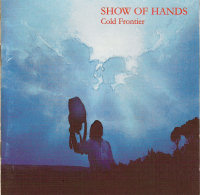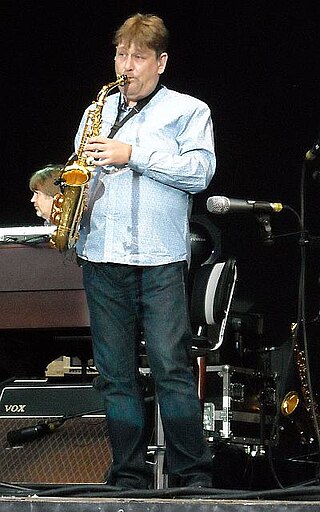
Kraftwerk is a German band formed in Düsseldorf in 1970 by Ralf Hütter and Florian Schneider. Widely considered innovators and pioneers of electronic music, Kraftwerk were among the first successful acts to popularize the genre. The group began as part of West Germany's experimental krautrock scene in the early 1970s before fully embracing electronic instrumentation, including synthesizers, drum machines, and vocoders. Wolfgang Flür joined the band in 1974 and Karl Bartos in 1975, expanding the band to a quartet.

Kling Klang is the private music studio of the band Kraftwerk. The name is taken from the first song on the Kraftwerk 2 album. The studio was originally located at Mintropstraße 16 in Düsseldorf, Germany, adjacent to Düsseldorf Hauptbahnhof, but in mid-2009 moved to Meerbusch-Osterath, around 10 kilometers west of Düsseldorf. The band also operate a record label named Kling Klang, which they use to release their music.

Death in Vegas are an English electronic music group, for which Richard Fearless serves as frontman. The band was formed in 1994 by Fearless and Steve Hellier and signed to Concrete Records under the name of Dead Elvis. Owing to an Irish record label of the same name, Dead Elvis became the title of their first album instead.

Runrig were a Scottish Celtic rock band formed on the Isle of Skye in 1973. From its inception, the band's line-up included songwriters Rory Macdonald and Calum Macdonald. The line-up during most of the 1980s and 1990s also included Donnie Munro, Malcolm Jones, Iain Bayne, and Pete Wishart. Munro left the band in 1997 to pursue a career in politics and was replaced by Bruce Guthro. Wishart left in 2001 and was replaced by Brian Hurren. The band released fourteen studio albums, with a number of their songs sung in Scottish Gaelic.

Cold Frontier is the ninth studio album by English acoustic roots duo Show of Hands. It was recorded in early 2001 on location by the Countess Wear at the River Exe, Exeter, Devon, with Mick Dolan, engineer for Steve Winwood, co-producing the album with the duo. The album features a stripped down, acoustic sound. The duo's website says the album is "possibly Show of Hands’ finest work so far." The album comes with a full colour twenty page booklet, all the lyrics, and comments on the background of each track.

The Peatbog Faeries are a largely instrumental Celtic fusion band. Formed in 1991, they are based in Dunvegan on the Isle of Skye, Scotland.
Celtic fusion is an umbrella term for any modern music which incorporates influences considered "Celtic", or Celtic music which incorporates modern music. It is a syncretic musical tradition which borrows freely from the perceived "Celtic" musical traditions of all the Celtic nations, as well as from all styles of popular music, it is thus sometimes associated with the Pan-Celtic movement. Celtic fusion may or may not include authentic traditional music from any one tradition under the Celtic umbrella, but its common characteristic is the inspiration by Celtic identity.

Solar Shears is the third studio album and fourth album overall by Scottish Celtic fusion band Shooglenifty. After the critical acclaim given to their underground second album A Whisky Kiss (1996), the band left Greentrax Recordings and signed to Vertical Records in the UK and Compass Records in the US and hired long time producer Jim Sutherland to produce their new album. The album sees the band expand their self-described "acid croft" sound, featuring a wide range of musical influences such as worldbeat, Eastern music, African music, psychedelic music, bluegrass, breakbeat and techno fused with a traditional Scottish Celtic music sound. With this album, Sutherland introduced many unorthodox approaches to the band's music, including looped beats, scratching, electro-atmospherics and sampled 'discovered sounds' from industrial clanks and rumbles to snatches of telephone conversation and recorded pelican crossing announcements.

Mellowosity is the debut studio album by Scottish Celtic fusion group Peatbog Faeries, released in 1996 on Greentrax Recordings. After forming as a vocal-based Celtic rock group in 1994, the duo had settled into becoming an instrumental Celtic fusion group by the release of Mellowosity. The album draws from a wide range of musical styles and influences including jazz, reggae, afrobeat, rock, Eastern music, dub and funk, that are mixed in with the band's traditional Scottish folk/Celtic sound featuring fiddles and bagpipes.

Faerie Stories is the second album by Scottish Celtic fusion group Peatbog Faeries, released in 2001 on Greentrax Recordings. The album was reissued in 2008 as a digipack. The album is large departure from the sound of their début album Mellowosity (1996), and sees the band explore a largely electronic sound mixed with their traditional Celtic fusion sound. Influences of electronic genres such as electronica, house, dubtronica and trip hop, in addition to even dub music and African music can be heard on the album fused with traditional Scottish Celtic music.

Welcome to Dun Vegas is the third album by Scottish Celtic fusion group Peatbog Faeries, released in July 2003 as the first release on the band's own Peatbog Records label. The album was recorded in a cottage on the banks of Pool Roag, near Dunvegan, on the Isle of Skye. Following the electronic-infused Faerie Stories (2001), Dun Vegas was co-produced between Calum MacLean and the band's drummer Iain Copeland. The album is experimental, mixing traditional and modern Celtic music with other genres and styles such as African music and electronica and featuring experimental effects including backwards drumming and a track based around a kitchen cooker timer.

Otherworld is an album by Lúnasa that was released 1999 on Green Linnet Records. It is the band's second major release. Although the album displays the band’s traditional Celtic sound, it features techniques and styles unusual to the genre, such as occasional double-tracking recording and occasional instances of instruments that differ from Celtic music, such as cello, electric bass and flügelhorn, leading Allmusic to say the album "yields a sound that is unique to the group and yet clearly in touch with tradition". The album has been described as innovative, with The Georgia Straight citing several tracks' usage of multiple woodwinds as an example.

What Men Deserve To Lose is the fifth album by Scottish Celtic fusion group Peatbog Faeries, recorded at Skye Recording in Roag on the band's native Isle of Skye in 2007, and was commercially released on 16 July 2007 on the band's own label Peatbog Records, though the album had been sold at festivals, and from the band's website, since 22 June 2007. It is the band's first album to feature Graeme Stafford, who brings what the band described as a "dancey" feel to the album.

Nigel Hitchcock is an English jazz saxophonist.

Dust is the sixth studio album by the Scottish Celtic fusion band Peatbog Faeries, released on 8 August 2011 on Peatbog Records, although pre-release copies were released on 20 July 2011 through the band's online shop. Following the band's 2008 tour and subsequent live album, the band's fiddle player Adam Sutherland and drummer Iain Copeland left the band, replaced by Peter Tickell and Stu Haikney respectively whose experience helped stir the band in a new direction. The band set to record Dust in 2011 with longtime producer Calum MacLean, beginning work in Orbost and concluding work at Cumbernauld College. Haikney brought experimental fiddle techniques to the band, and similarly experimental production techniques, whilst the entire band experimented with various genres of music including African music, funk, reggae, ambient music and electronic music alongside the band's traditional Celtic fusion sound. The brass sound of previous albums also returned. The album was also an attempt to translate the band's live sound to studio work.

Live is the first live album by Scottish celtic fusion band Peatbog Faeries, released in 2009 by Peatbog Records. It is a compilation album of live tracks from two of the band's concerts in their 2008 tour, and is the band's first album to have been released in a digipak.

The Fiddle Collection is a studio album with tracks from various British fiddle players produced by Phil Beer. Released in 1999, it was Beer's first solo project of the year during his temporary break from Show of Hands. Promoted with the tagline "this really is modern folk music", it featured fifteen different, original tracks by different UK violin-playing folk musicians, and was designed to represent the fiddle and folk scene in the United Kingdom.

Blackhouse is the seventh studio album by Scottish celtic fusion band Peatbog Faeries, released in May 2015 by the band's label Peatbog Records. After recording their acclaimed album Dust (2011), the band played live for the following few years, during which time fiddler Peter Tickell left the band, to be replaced by Ross Couper. As the band had not recorded an album for some years, they returned to record Blackhouse mainly in a cottage in Kilchoan, Ardnamurchan during 2014, although recording continued into 2015. Their first album with Touper, and their first without a brass section since Welcome to Dun Vegas (2003), Blackhouse was produced by Calum MacLean and displays a very eclectic array of genres, fusing the band's Scottish celtic roots with genres such as jazz, funk, reggae, dance and house.

Skye Live Festival is an annual two-day music festival taking place at The Lump, the traditional home of the Skye Highland Games, in Portree on the Isle of Skye in Scotland.

Zoë Bestel is a Scottish singer-songwriter, who describes her music as Nu-Folk. She started learning the Ukulele in 2011 and released her first EP in 2012. Bestel has released two albums, been nominated for the Scottish Alternative Music Awards under the Best Acoustic category and supported artists such as Nathan Connolly of Snow Patrol, Emily Smith, The Paul McKenna Band, The Peatbog Faeries, Erin Rae, Chris Wood, Paul Brady, Steve Tilston and Bella Hardy.




















